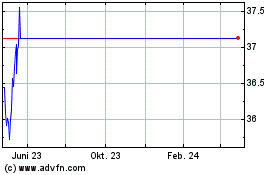ABB survey finds 70% of US businesses looking to bring production closer to home, robotic automation and workforce upskilling essential to return of operations
28 Juni 2022 - 3:24PM

- 70% plan to reshore or nearshore to address supply chain
issues, 43% will use automation and robotics to build supply chain
resilience
- At SelectUSA Investment Summit in Washington, DC, Sami Atiya,
President of ABB’s Robotics & Discrete Automation Business
called for public/private partnerships to upskill and prepare
workers for the future of work
In response to the COVID-19 pandemic, geopolitical disputes, raw
materials shortages and trade issues that have rocked global
economies and supply chains, a majority of U.S.-based companies are
planning to relocate production closer to home.
Surveying 1,610 executives in the U.S. and Europe, ABB found
that 70% of U.S. businesses are planning changes in their
operations, with 37% planning to bring production back home and 33%
looking to nearshore and shift their operations to a closer
location.
“Business leaders are responding to unprecedented supply
chain disruptions by putting into place measures to make operations
more resilient and adaptable,” said Sami Atiya President of ABB’s
Robotics & Discrete Automation Business, at SelectUSA. “While
investment in automation plays a key role in flexibility in
operations, equally important is investment in education,
vocational training, and apprenticeship programs needed to create
safer, higher-paying jobs for American workers.”
Atiya explained how the increasing need for flexibility and
resilience in production is driving the interest in
reshoring/nearshoring and, as a result, the demand for more
automation. He underscored the role of robotics in facilitating
reshoring or nearshoring efforts, addressing supply chain concerns
and maintaining global competitiveness for U.S. businesses.
Once confined to the automotive industry, automation and
robotics have significantly expanded across multiple industries and
sectors across the United States, including logistics, food and
beverage, retail, and healthcare. American companies are
increasingly turning to automation and robotics driven by the need
for greater flexibility in operations, widespread labor shortages
and an aging workforce.
According to the International Federation of Robotics, the
increase in robot density per 10,000 workers in North America,
jumped 28% in Q1 2022 compared to the first quarter of 2021, the
highest rate of growth since records have been kept. While in one
sector alone, the American Welding Society says the US will face a
shortage of 400,000 welders by 2024.
ABB’s study also found that American companies are relying more
on automation to solve their supply chain woes. 43% of businesses
surveyed indicated that they will use automation and robotics to
build supply chain resilience, with 75% of US-based businesses
noting that robotics and automation will play a significant role in
addressing supply chain issues.
Although there is a greater demand for robotics in the United
States, ABB’s survey found that the rate of investment in
automation remains higher in Europe, with 74% of European
businesses indicating they will invest in robotics and automation
in the next three years — compared to 62% in the US.
The role of automation and robotics in reshoring or nearshoring
operations in the U.S. also depends on bridging the skills gap in
robotics education and better educating and upskilling workers.
“Robotics and automation are job creators, requiring new ways of
working with new skillsets,” noted Atiya “We are working with the
U.S. government to share ABB’s experience in the US and other
countries where we operate on how we can accelerate robotics and
automation education, vocational training, and apprenticeship
programs needed to create safer, and higher-paying jobs for
American workers.”
Atiya presented at Select USA Tech: The Future of High-Tech
Industries alongside other companies including Softbank Group
International, GymPass and A-to-Be. In addition to talking about
automation and robotics and the growing move to bring production
closer to home, Atiya also noted that the business-friendly
environment and level of entrepreneurship in the United States
fuels ABB’s own innovation and growth there.
###
ABB in the United States
Since 2010, ABB has invested $14B in the U.S. with plant
expansions, operational improvements, state-of-the-art equipment,
products, and people, making it the company’s largest market. With
approximately 20,000 employees in more than 40 manufacturing and
distribution facilities, ABB is investing, growing and serving
across America through industries that create jobs, encourage
innovation and achieve a more productive, sustainable future. ABB
Robotics and Discrete Automation operates a robotic facility in
Auburn Hills, Michigan serving the automotive, food and beverage,
healthcare and other industries.
ABB Robotics & Discrete Automation is a pioneer in
robotics, machine automation and digital services, providing
innovative solutions for a diverse range of industries, from
automotive to electronics to logistics. As one of the world’s
leading robotics and machine automation suppliers, we have shipped
over 500,000 robot solutions. We help our customers of all sizes to
increase productivity, flexibility and simplicity and to improve
output quality. We support their transition towards the connected
and collaborative factory of the future. ABB Robotics &
Discrete Automation employs more than 10,000 people at over 100
locations in more than 53 countries. www.abb.com/robotics
- ABB Robotics & Discrete Automation
Michael Touhill
ABB
(404) 680-7930
michael.touhill@us.abb.com
ABB (NYSE:ABB)
Historical Stock Chart
Von Nov 2024 bis Dez 2024

ABB (NYSE:ABB)
Historical Stock Chart
Von Dez 2023 bis Dez 2024
